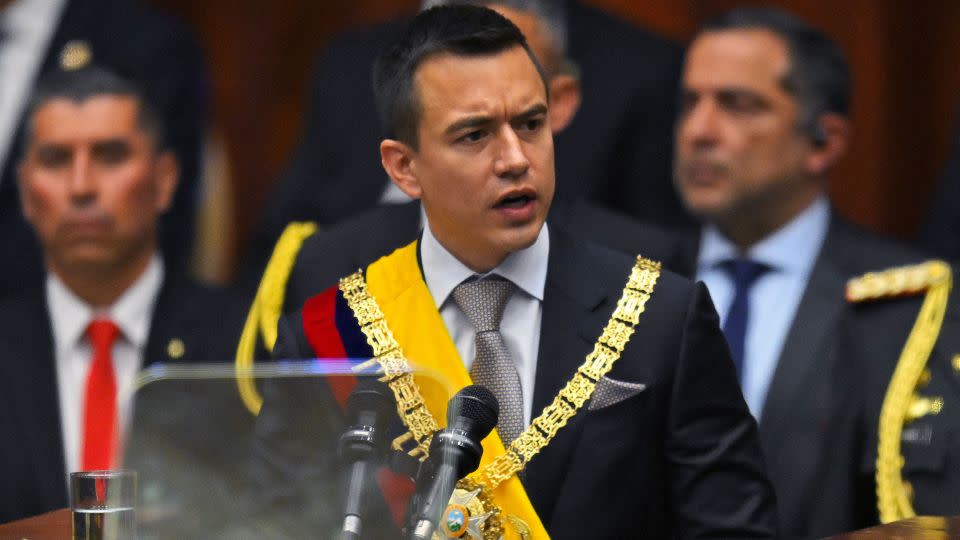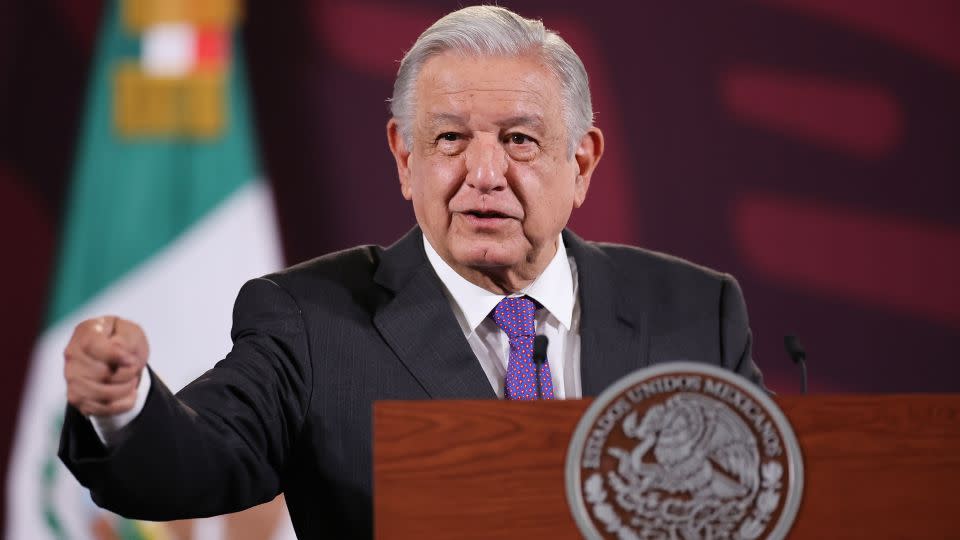Ecuador’s raid on Mexico’s embassy shocked Latin America. Here’s why it may still pay off for Daniel Noboa
Latin America has seen plenty of diplomatic wrestling in recent weeks, from Argentina’s president calling his Colombian counterpart “a terrorist murderer” to Venezuela’s latest attempt to take back a territory ruled by neighboring Guyana. But none of that has been quite as hands-on as Ecuador’s highly controversial decision to raid Mexico’s embassy – a major violation of diplomatic norms that continues to reverberate across the region.
Surveillance footage from the incident in Quito last week showed Ecuadorian police grappling with the Mexican mission’s top diplomat as they arrested Jorge Glas, Ecuador’s former vice president who had been seeking asylum from Mexico when the raid took place.
The dramatic scenes also point to a new approach to crime in the region and underline how the youngest leader in Latin America, Ecuadorean President Daniel Noboa, may be throwing out conventional wisdom – to the likely chagrin of his septuagenarian Mexican counterpart Andres Manuel Lopez Obrador.
Two very different politicians
Noboa, 36, rose to Ecuador’s presidency in a political finger snap. His predecessor, Guillermo Lasso, resigned and called for early elections amid a constitutional crisis in May last year. The resulting race was dominated by the country’s rising crime wave – all too evident when an anti-corruption candidate, Fernando Villavicencio, was assassinated on August 9.
The son of a banana tycoon with limited political experience under his belt, Noboa capitalized on the vote for a tough-on-crime approach. Less than two months after taking office, Ecuador’s security crisis made global headlines when gunmen stormed a television studio live on air shortly after one of the most infamous criminals in the country, Alfredo ‘Fito’ Macias, escaped from prison.

‘Fito’ remains at large, but since then, Noboa has kept the nation in a permanent state of emergency. He has declared an internal armed conflict against the drug cartels, sent the military to the streets, and called for emergency security measures to be drafted in the Constitution in a referendum on April 21.
He also vowed to kickstart a new era for Ecuador, a clean break from his predecessors who allowed crime to run the street.
That may be one reason why Noboa has pushed so hard to arrest Glas. The ex-vice president had sought protection from embezzlement charges by requesting asylum in Mexico, saying that the accusations were politically motivated. But Glas, already twice convicted for corruption and a close ally to his former boss, Rafael Correa, had become emblematic of the past that Noboa rejects – and a test of his determination to clean house.
For a moment, Glas appeared to have found refuge. Lopez Obrador has previously used Mexico’s diplomatic channels to rescue political allies, from welcoming Bolivia’s Evo Morales in 2019 to offering asylum to the family of Peru’s Pedro Castillo in 2022.
A close ideological ally of Correa, Lopez Obrador had since December allowed Glas to live at the Mexican embassy—territory that is technically off limits for local authorities.
But then he appeared to add insult to irritation. Lopez Obrador last week seemed to criticize the election that brought Noboa to power, suggesting the climate of fear created by Villavicencio’s murder had favored Noboa.
On April 5,the Ecuadorean leader broke diplomatic norms and ordered an unprecedented operation to seize Glas by force, throwing Ecuador’s relations with Mexico into a tailspin.
A crucial vote and Noboa seeks a boost
Ecuador’s April 21 vote is crucial to put the current diplomatic crisis into context, analysts say. Noboa defended his decision to raid a foreign embassy – a violation of the Vienna Convention – by saying the security crisis in Ecuador called for “exceptional decisions,” and that he could not allow a convicted criminal to escape justice.
In an open letter published on Monday, he tied his action to the upcoming referendum, claiming “a vast majority of Ecuadoreans” would defend his decision with their vote.
“It could well be that the raid grants him a spike of popularity,” said Santiago Orbe, an Ecuadorian international analyst.
“The government has been under pressure because of Fito’s escape and then for trying and failing to send old weapons to Ukraine. This action, however impulsive and frankly disproportionate, shows that they do not lack courage when making decisions,” Orbe told CNN.

While Lopez Obrador is at the sunset of his political career, Noboa is just getting started and seeks a strong platform to run for re-election next year.
“Noboa is part of a new generation of very quick politicians who act first and listen later. Ecuador will probably pay a price in terms of its international stance, but in the short term, such a brazen action will help Noboa, whose platform is all about security and law on crime,” Orbe said.
Others, like Mexican columnist Emilio Lezama, have compared Noboa’s actions to those of another young politician who is very popular across the region because of his tough-on-crime approach at the cost of some rule-breaking: El Salvador’s Nayib Bukele.
Fewer leaders worldwide have embodied a security crackdown more than El Salvador’s president, who has ruled with emergency powers for more than two years.
While his tenure has been marked by concern for alleged human rights abuse -at some point, El Salvador put roughly 2% of its adult population behind bars– it’s fair to say that Bukele’s policies are overwhelmingly popular with his countrymates.
This year, Bukele won re-election in a landslide.
Support for authoritarian measures to tackle the chronic issues of crime and economic growth in Latin America has significantly increased since the turn of the century.
According to Latinobarometro, a regional pollster that tracks opinions across 17 different Latin American countries, 60% of respondents believed democracy was the preferred form of government for their country under any circumstance in 2006, when Lopez Obrador mounted his first presidential run.
In 2023, the year Noboa was elected, it was 48%.
It’s too early to say whether Noboa’s gamble will pay off at the ballot boxes, or if Ecuador will be sanctioned in multilateral forums – Mexico has already announced it will sue Ecuador at the International Court of Justice.
But it’s not too early to see the growing appetite for such brazen actions.
For more CNN news and newsletters create an account at CNN.com
